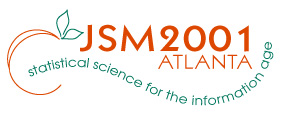
|
JSM 2001 Program |

|
JSM 2001 Program |
|
The views expressed here are those of the individual authors
Deming Lecture Handouts - view here to download and print out these Handouts compiled by Gerry Hahn |
Select the Activity Types you want to view |
|
People Index |
|
Advanced Search
You can search the Abstracts for the 2001 Joint Statistical
Meetings in Atlanta.There are several different types of searches you can perform. Hit the appropriate button for:
|
|
JSM 2001
For information, contact meetings@amstat.org or phone (703) 684-1221. If you have questions about the Continuing Education program, please contact the Education Department. Revised March 2001 |